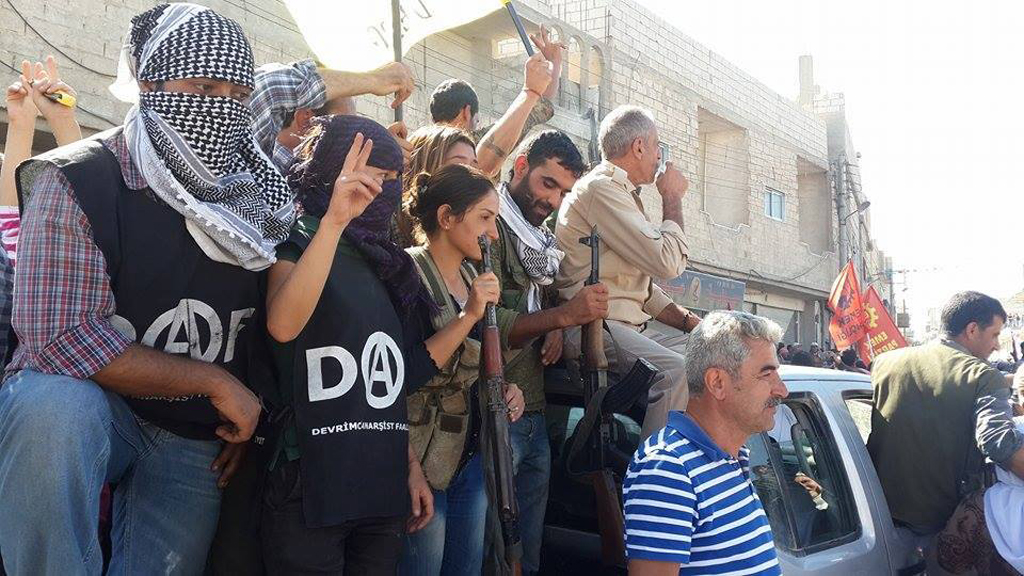Taksim to Kobani: Turkish anarchists defy Syrian border
Turkish anarchists, who made headlines around the world during the battle for Taksim Square, have decamped to the besieged Kurdish town of Kobani to support the fight against the Islamic State.

Image credit DAF
While Turkish security forces look on from across the border as the Islamic State continues its onslaught against Kobani, a group of Turkish activists have crossed the border to support the Kurds, writes Brian Whelan.
They call themselves Devrimci Anarsist Faaliyet (Revolutionary Anarchist Action), and their members were on the barricades last year when major protests erupted around Taksim Square and Gezi park in Istanbul.
Speaking to Channel 4 News, the group reveals it has visited Kobani on three occasions, bypassing Turkish border guards and helping Kurdish refugees to escape into Turkey.
We were part of the resistance that started in Taksim and Gezi park. Turkish anarchist spokesperson
“The most important task was to help civilians from Kobani to pass through the border. After that we supported immigrants for transportation, setting up tents, organising the distribution of materials sent in solidarity,” one group member explained.
“We were part of the resistance that started in Taksim Gezi park. We were part of the resistance against police violence, against state terrorism and in the direct democracy experience afterwards.”
“After Taksim Square was occupied, we have actively participated in resistance along the barricades and behind the barricades. However we have to make this clear: we are not only in the streets when the turmoil in society is high.”
Read more: Kurdish spring: what are the PKK fighting for?

Image credit DAF
Prison conversion
The links between Kurdish groups and anarchists were born from the proscribed PKK (Kurdistan Workers Party) leader Abdullah Ocalan‘s prison conversion to the writings of Murray Bookchin, a New York anarchist academic.
In Kobani the PYD (Democratic Union Party) and its armed wing, the YPG, are followers of Ocalan, and have attempted to implement an autonomous form of Kurdish direct democracy. Turkish radicals are hoping to learn from this experience.
“YPG is organising the fight at the highest level against Isis as a self-defence force. So we are trying to support in every way possible,” the anarchist explained.
Protest calls
The border near Kobani has seen violent scenes as Turkish forces attempt to control the flow of refugees both into Turkey and back to Syria.
In recent days the DAF have been supporting calls for people to come onto the streets to protest against the Turkish government’s stance on Syria.
Police have used tear gas and water cannon this week as unrest spread to six Turkish cities over Turkey’s lack of action against IS.
One 25-year-old protester was killed in the eastern province of Mus and there were other deaths reported in Diyarbakir, Turkey’s largest Kurdish city.

Image credit DAF
Peace process threatened
The activists worry that the government is not taking the ongoing and currently quite delicate peace process with the PKK seriously. The fall of Kobani could severely harm and hope of peace between Turkey and Kurdish groups.
“The Turkish state is watching with pleasure the Isis bombing of YPG and its march. When the people of Rojava feel unsafe and cross the border, the state interprets this as a decrease in peoples confidence in YPG,” the groups spokesperson claimed.
“Each position that the Kurdish people’s movement loses against Isis is interpreted by the state as a loss of the power across the table.”
“Our relationship with Kurdish individuals and society and the organisation of Kurdish people, has been mutual solidarity.”
In the UK in recent days the Kurdish community has been holding daily marches and attempting to blockade tube stations and airports in a bid to draw attention to its cause.
Similar protests in a number of German cities have ended in violent clashes, with radical Muslims using knives in an attack on a Kurdish protest in Hamburg.